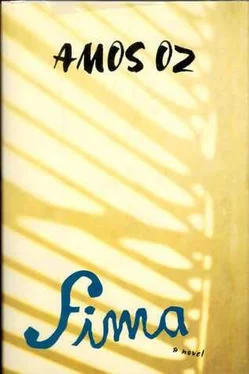What became of the Danzigs? They must have died ages ago. A branch of a bank had stood for years on the site of that little restaurant that gleamed with a cleanness which even now, a thousand years later, Fima could feel in his nostrils, and which for some reason smelled to him like fresh snow. On each table, on the spotless white tablecloth, there was always an upright rose in a glass vase. The walls were adorned with calm landscapes of lakes and forests. Sometimes at a table in the far comer near the potted palms a slim British officer would be lunching on his own. He would sit stiffly, with his peaked cap parked at the foot of the rose. Where have those pictures of lakes and forests ended up? Where in the world is that lonely British officer eating now? A city of longings and madness. A refugee camp, not a city. But you could still get away from it. You could take Dimi and Yael away from here and join a kibbutz in the desert. You could propose to Tamar or to Annette Tadmor, settle down with her in Magdiel, and get a job as a clerk in a bank, in the health service, or in the national insurance, and start writing poetry again in the evenings. Start a new chapter. Get a little closer to the Third State.
His feet led him of their own accord into the maze of narrow streets which is the Bukharian Quarter. Slowly he shuffled underneath gaudily bedecked clotheslines stretched across the gray street. On balconies with rusting wrought-iron balustrades he could see dried skeletons of palm booths left over from Sukkoth, heaps of scrap iron and junk, suspended copper washing kettles, moldering packing boxes, jerry cans, all the refuse of the run-down flats. Almost every window here was curtained in garish colors. On the windowsills stood glass jars inside which cucumbers were slowly pickling in a broth of garlic, dill, and parsley. Fima suddenly felt that these guttural places, built around courtyards with ancient stone wells, smelling of grilled meat, onions, baking pastry, spiced dishes, and smoke, offered him a simple, straightforward answer to a question he had totally failed to frame. Something was hammering urgently at his chest both outside and within, gently plucking and gnawing, like the long-forgotten music of Johnny Guitar, like the lakes and forests on the walls of the little restaurant that his mother used to take him to after shopping in the market on Fridays. And he said to himself:
"That's enough. Drop it."
Like someone scratching at a sore, unable to stop even though he knew he should.
In Rabbenu Gershom Street he passed three short, plump women who looked so alike that Fima supposed they were sisters, or perhaps a mother with her daughters. He eyed them with an intrigued gaze. They were lush, generously fleshed women, as curvaceous as slave girls in a painting of an Oriental seraglio. His imagination pictured their expansive, abundant nakedness, then their submissive, obedient surrender, like waitresses dishing out warm helpings to a queue of starving men without taking the trouble to distinguish the recipients one from another, bestowing the gift of their bodies indifferently, out of habit, and with a touch of boredom. The boredom and indifference seemed far more sexual and provocative to Fima at that moment than all the sensual excitement in the world. A moment later came a wave of shame that extinguished his desire. Why had he forgone Yacl's body that morning? If he had only invested a little more cunning and patience, if he had only persevered, surely she would have given in. Without desire, but so what? Was it a question of desire?
But, then, what was it a question of?
The three women disappeared around the corner, but Fima stayed rooted to the spot, staring blankly, excited and ashamed. Surely the truth was that this morning he had not craved Yael's emaciated body. Rather, he had longed vaguely for a different kind of union, not a carnal union, nor the union of child and mother, perhaps no union at all, something that Fima could not even name, but nevertheless he felt that this thing, elusive as it was and too fine to be defined, if he could only be blessed with it once, just once, might change his life for the better.
On second thought, the words "change his life for the better" seemed to suit a muddled, acne-ridden adolescent rather than a man who was capable of leading a nation out of crisis and onto the road to peace.
Later, Fima lingered outside a tiny shoeshop which was also a cobbler's, to inhale the smell of caoutchouc, the intoxicating cobbler's glue. And meanwhile he caught a snatch of conversation between a middle-aged religious man, who looked like the bursar of a charitable foundation or a minor synagogue functionary, and an overweight, shabby, unshaven reservist in ill-fitting fatigues.
The soldier said:
"The thing with them is, the boy always looks after the granny. He doesn't budge from her side all day long. Every thirty seconds he checks to make sure she hasn't walked off again, Heaven forbid! Her head's gone to pieces, but she's still got the use of her legs, and take it from me, she's as quick as a cat on them."
The older man, the bursar, remarked sadly:
"The mind inside the head looks like a piece of cheese. Sort of yellowy-white, with wrinkles. They showed it on the TV. And when your memory goes, the scientists have discovered that it's because of the dirt. It's little worms that get inside and nibble at the cheese. Till it's all rotten. You can even get a whiff of it sometimes."
The soldier corrected him knowledgeably:
"It's not worms, its bactaria. The size of a grain of sand. You can hardly see them even with a magnifying glass, and there are hundreds of them born every hour."
Fima went on his way, thinking over what he had heard. For a moment his nostrils could almost catch the smell of rotting cheese. Then he lingered in the doorway of a greengrocer's. Crates of aubergines, onions, lettuces, tangerines, and oranges were laid out on the pavement. Around them hovered flies and one or two wasps. It would be good to go for a walk down these lanes with Dimi someday. He could feel the warmth of the boy's fingers in his empty hand. And he tried to imagine what sort of intelligent remarks he would hear from the pensive Challenger when they strolled here together, in what new light he would be made to see all these sights. Dimi would certainly notice aspects that were hidden from him, because he lacked the boy's powers of observation. Who did Dimi get them from? Teddy and Yael were always concentrating on the tasks in front of them, whereas Baruch was absorbed in his anecdotes and morals. Maybe the best plan of action would be to move in with them. He could begin, for instance, with a temporary invasion, a bridgehead, using the painters as an excuse, assuring the family at first that it was only for a day or two, a week at the most, he wouldn't be a nuisance, he'd gladly sleep on a mattress in the utility room off the kitchen balcony. As soon as he arrived, he'd start cooking for them, washing up, ironing, looking after Dimi while they were out, helping him with his homework, washing Yael's underwear, cleaning Teddy's pipe for him; alter all, they were out of the house a good deal, whereas he was a man of leisure. After a few days they'd get used to the arrangement. They would appreciate its advantages. They would come to be dependent on Fima's domestic services. They wouldn't be able to manage without him. It might well be Ted, a broad-minded, unprejudiced individual, a clear-thinking scientist, who would see the all-around benefits. Dimi would no longer be left to roam alone outside all day, relying on the kindness of the neighbors, at the mercy of their bullying children, or condemned to solitary confinement in front of the computer screen. Ted himself would be relieved of the burden of living constantly tête-à-tête with Yael, and so he also would be liberated a bit. As for Yael, it was hard to predict: She might accept the new arrangement with an indifferent shrug of the shoulders, she might just give one of her occasional silent laughs, or she might walk out and go back to Pasadena, leaving Dimi to Ted and me. This last possibility bathed Fima's mind in a supernal glow of light. It seemed really exciting: a commune, an urban kibbutz, three male friends devoted to one another, full of consideration, tied to each other by bonds of affection and mutual attentiveness.
Читать дальше












